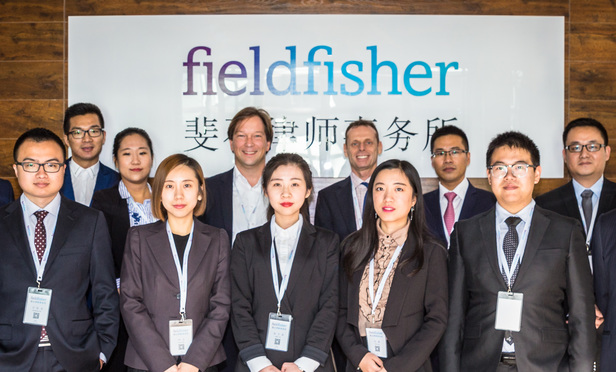Fieldfisher seals merger with Beijing law firm
Firm eyes Shanghai launch following Beijing tie-up
November 15, 2016 at 05:35 AM
3 minute read
Fieldfisher has merged with Beijing boutique JS Partners under a Swiss verein, making it the latest international law firm to gain Chinese law capability.
JS Partners, which will will adopt the Fieldfisher brand, has made several partner hires ahead of the tie-up, notably antitrust partner Zhaofeng Zhou, who joined as managing partner this July from Bird & Bird's Beijing office. According to Zhou, the firm also has plans to open a Shanghai office soon.
In addition to antitrust and intellectual property, the 12-partner firm advises on cross-border commercial law including corporate, finance, tax and dispute resolution. It was founded in 2008 by partner Liu Jinshi, who specialises in Japan and Korea work.
Three years ago, Fieldfisher secured a presence in Shanghai through a Swiss verein combination with three-partner firm Ryser & Associates. However, that tie-up has since ended.
In a statement, Fieldfisher managing partner Michael Chissick said: "Our relationship with Ryser & Associates has, for the last three years, been of great value to the firm. However, as Fieldfisher continues to grow it became apparent that we need a larger partner in China. As such, we mutually agreed to end the relationship but retain a good working relationship with the firm."
Under the verein structure, Fieldfisher will operate as a licensed Chinese law firm, with access to all aspects of Chinese legal practice. The setup was pioneered in 2012 by legacy King & Wood when it merged with Australian firm Mallesons Stephen Jaques. Last year, the same structure was used by Dentons when it merged with Beijing-based Dacheng.
The news comes after Hogan Lovells last month announced a joint venture with China's Fidelity Law Firm in the Shanghai Free Trade Zone (FTZ). Baker & McKenzie and Holman Fenwick Willan have also entered similar arrangements with Chinese firms under the FTZ pilot programme.
Last year, US firm McGuireWoods launched a strategic partnership with Shanghai-based FuJae Partners, with both firms remaining independent while functioning as one unit. A similar structure was also used in 2007 by McDermott Will & Emery and Shanghai firm MWE China Law Offices; and in 2011 by Pinsent Masons and China's Hesen Law Firm.
Earlier this year, Linklaters announced it will launch its own "captive" Chinese law firm with a group of its own lawyers.
Meanwhile, Stephenson Harwood, which has registered in China as a Hong Kong law firm, took advantage of the Closer Economic Partnership Arrangement (CEPA) – a free-trade agreement between mainland China and Hong Kong – to form an association with Guangzhou-based Wei Tu. CEPA allows Hong Kong law firms to operate in association with mainland firms under one license and give Chinese legal advice via the Chinese firm.
In 2013, Clyde & Co, which also registered as a Hong Kong firm in China, launched a similar tie-up with Chongqing's West Link Partnership in southwestern China.
This content has been archived. It is available through our partners, LexisNexis® and Bloomberg Law.
To view this content, please continue to their sites.
Not a Lexis Subscriber?
Subscribe Now
Not a Bloomberg Law Subscriber?
Subscribe Now
NOT FOR REPRINT
© 2025 ALM Global, LLC, All Rights Reserved. Request academic re-use from www.copyright.com. All other uses, submit a request to [email protected]. For more information visit Asset & Logo Licensing.
You Might Like
View All
Kirkland’s O’Shea Acts Alongside Former Outfit Simpson Thacher on KKR Deal
2 minute read

Hengeler, Noerr, Freshfields Steer Multi-Million Euro Deals for XXXLutz, Huf Group & More
3 minute read
Trending Stories
- 1New York-Based Skadden Team Joins White & Case Group in Mexico City for Citigroup Demerger
- 2No Two Wildfires Alike: Lawyers Take Different Legal Strategies in California
- 3Poop-Themed Dog Toy OK as Parody, but Still Tarnished Jack Daniel’s Brand, Court Says
- 4Meet the New President of NY's Association of Trial Court Jurists
- 5Lawyers' Phones Are Ringing: What Should Employers Do If ICE Raids Their Business?
Who Got The Work
J. Brugh Lower of Gibbons has entered an appearance for industrial equipment supplier Devco Corporation in a pending trademark infringement lawsuit. The suit, accusing the defendant of selling knock-off Graco products, was filed Dec. 18 in New Jersey District Court by Rivkin Radler on behalf of Graco Inc. and Graco Minnesota. The case, assigned to U.S. District Judge Zahid N. Quraishi, is 3:24-cv-11294, Graco Inc. et al v. Devco Corporation.
Who Got The Work
Rebecca Maller-Stein and Kent A. Yalowitz of Arnold & Porter Kaye Scholer have entered their appearances for Hanaco Venture Capital and its executives, Lior Prosor and David Frankel, in a pending securities lawsuit. The action, filed on Dec. 24 in New York Southern District Court by Zell, Aron & Co. on behalf of Goldeneye Advisors, accuses the defendants of negligently and fraudulently managing the plaintiff's $1 million investment. The case, assigned to U.S. District Judge Vernon S. Broderick, is 1:24-cv-09918, Goldeneye Advisors, LLC v. Hanaco Venture Capital, Ltd. et al.
Who Got The Work
Attorneys from A&O Shearman has stepped in as defense counsel for Toronto-Dominion Bank and other defendants in a pending securities class action. The suit, filed Dec. 11 in New York Southern District Court by Bleichmar Fonti & Auld, accuses the defendants of concealing the bank's 'pervasive' deficiencies in regards to its compliance with the Bank Secrecy Act and the quality of its anti-money laundering controls. The case, assigned to U.S. District Judge Arun Subramanian, is 1:24-cv-09445, Gonzalez v. The Toronto-Dominion Bank et al.
Who Got The Work
Crown Castle International, a Pennsylvania company providing shared communications infrastructure, has turned to Luke D. Wolf of Gordon Rees Scully Mansukhani to fend off a pending breach-of-contract lawsuit. The court action, filed Nov. 25 in Michigan Eastern District Court by Hooper Hathaway PC on behalf of The Town Residences LLC, accuses Crown Castle of failing to transfer approximately $30,000 in utility payments from T-Mobile in breach of a roof-top lease and assignment agreement. The case, assigned to U.S. District Judge Susan K. Declercq, is 2:24-cv-13131, The Town Residences LLC v. T-Mobile US, Inc. et al.
Who Got The Work
Wilfred P. Coronato and Daniel M. Schwartz of McCarter & English have stepped in as defense counsel to Electrolux Home Products Inc. in a pending product liability lawsuit. The court action, filed Nov. 26 in New York Eastern District Court by Poulos Lopiccolo PC and Nagel Rice LLP on behalf of David Stern, alleges that the defendant's refrigerators’ drawers and shelving repeatedly break and fall apart within months after purchase. The case, assigned to U.S. District Judge Joan M. Azrack, is 2:24-cv-08204, Stern v. Electrolux Home Products, Inc.
Featured Firms
Law Offices of Gary Martin Hays & Associates, P.C.
(470) 294-1674
Law Offices of Mark E. Salomone
(857) 444-6468
Smith & Hassler
(713) 739-1250









